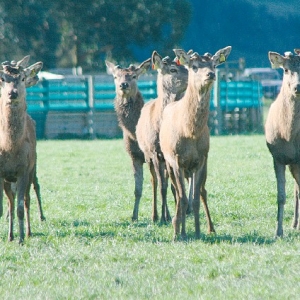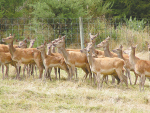This follows four years of research showing that internal parasite resistance is becoming widespread across the industry. Deer Industry New Zealand (DINZ) producer manager Tony Pearse says the use of one drench family – mectins – applied as pour-ons, along with poor application technique, are the cause.
"Replacing a mectin pour-on with an injectable can dramatically improve growth rates, but the best bet – based on recent on-farm trials – is to use a triple mix: a mectin injection, plus a white/clear combination oral drench."
He knows of farmers who have increased weaner growth rates from 250 g a day to 400 g a day just by switching to a mectin injectable. Better weaner health and a reduction in losses from Yersinia and Johne's have also been reported.
Importantly, the triple mix helps stave off the inevitable – the day when parasites develop resistance to all three drench families. This is crucial, because trials suggest that two new drenches on the market, Startect and Zolvix, are ineffective in deer.
Before embarking on the preferred triple mix, Pearse says farmers should consult their veterinarian.
"This is because it involves departing from label directions. Once you go off-label, a default withholding period of 91 days kicks-in. With a veterinary prescription this drops to 49 days for Cydectin injection."
Southland research veterinarian Dave Lawrence, who has conducted the parasite control trials, says deer on all farms tested so far have internal parasites resistant to mectin drenches.
"So far the only treatment shown to be effective against ostertagia-type parasites on these farms is Cydectin injection plus an oral white & levamisole combination drench. Research last year showed that the standard cattle dose of the white drench, oxfendazole, was inadequate for deer and that more than a triple dose is required."
He says the recommended drench regime is available from deer veterinarians and is posted on the DINZ website, along with detailed internal parasite management advice.
"It is important to get dose rates right. Under-dosing accelerates resistance. Over-dosing can be fatal."
Dr Lawrence also advises farmers to adopt integrated parasite management practices that reduce both the need for drenching and the risk of resistance developing. This includes quarantine drenching of incoming animals, minimising the drenching of adults and integrated grazing with other livestock species.
"Farmers who are taking an integrated approach to managing internal parasites are absolutely rapt. They are getting their animals away earlier at heavier weights," he says.
"And don't think resistance won't happen to you. Deterioration in drench efficacy can happen rapidly. A 50%reduction in three years is not unheard of."
The trials have been funded by DEEResearch – the agency that channels farmer levies into research – with additional funding from NZDFA branches and the Elk & Wapiti Society.



















